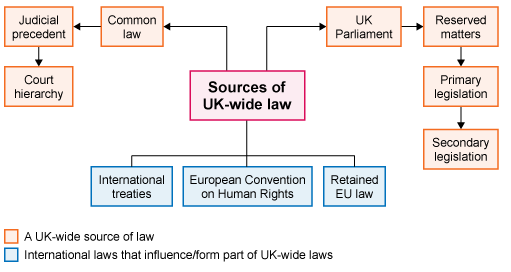3 Sources and classification of immigration law
There are several sources of law in the UK that influence and shape the way that immigration law is created, developed and implemented. You have already been introduced to primary and delegated legislation, but there are also certain court and tribunal decisions that have to be followed. Common law, equity and human rights also play a role as sources of law in the UK’s legal systems. All these combine to create what are referred to as ‘domestic’ sources of law.
In addition, the UK is a signatory to, and has ratified, a number of international treaties. Examples that are relevant to immigration law are the 1951 Refugee Convention, the 1953 European Convention on Human Rights and the 2020 EU–UK Trade and Cooperation Agreement. (You should note that free movement between the UK and the EU ended on 31 December 2020, and future EU laws will no longer directly apply in the UK.)
What is a treaty?
Under international law, a treaty is a legally binding agreement that is voluntarily entered into by States (countries). It applies at international level.
Treaties take the form of formal understandings or commitments on specific matters between two or more countries. An agreement between two countries is called a bilateral treaty; an agreement between several countries is a multilateral treaty.
States can subsequently decide to withdraw from a treaty.
As with UK legislation, treaties may be referred to in different ways: for example, as a Convention, Protocol, Pact or Accord.
The countries signing a treaty are generally referred to as Parties, or High Contracting Parties.
In the UK’s legal system, although Parliament is regarded as having parliamentary sovereignty (that is, in theory the UK Parliament can enact or repeal any law), it is not required to approve (sometimes termed ‘ratify’) an international treaty before it takes effect , unless the treaty is changing domestic law. Treaties remain a matter for the UK Government. Parliament comprises all the members of both Houses of Parliament and is the body that makes primary (and some secondary) legislation. The UK Government is made up of the Cabinet, the monarch (in certain matters) Privy Councillors. Note that each devolved nation (Northern Ireland, Scotland and Wales) has its own legislative body (Parliament) and Government.
Treaties are one form of international law and represent obligations that the UK has freely entered into with other States as part of its international role and its commitment to the international community.
Activity 2: Sources of immigration law
The UK’s immigration and asylum laws come from a range of sources: it could be primary or secondary legislation in Parliament, part of a Government Minister’s prerogative powers, or international law that the UK has signed up to. Identify where the following laws come from:
Discussion
The activity did not introduce the examples of common law, equity or human rights:
- Common law is based on judicial decisions and embodied in reports of decided cases. If it conflicts with primary legislation, then primary legislation takes priority over it.
- Equity incorporates different ideas and concepts, including justice, fairness and even equality. Equity is a division or branch of private common law (distinct from public and criminal law), comprised of rules, doctrines, principles and procedures that are largely occupied with matters relating to private and commercial property in its many forms.
- Human rights law is enshrined in the Human Rights Act 1998, which sets out the fundamental rights and freedoms that everyone in the UK is entitled to. Public bodies in the UK have a duty to act in accordance with the rights and obligations set out in the European Convention on Human Rights.

